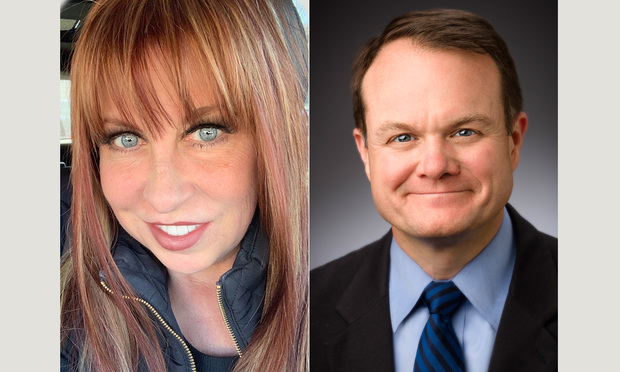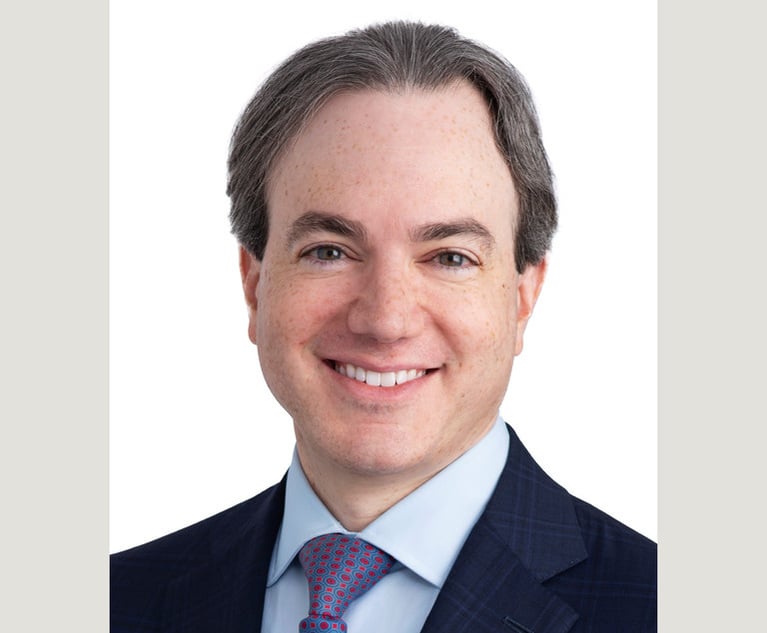Fraud, Third-Party Risks Still Top Concerns for Chief Compliance Officers
The January 2020 Corporate Compliance & Ethics Report, developed in connection with the Consero Group's biannual forum on compliance and ethics, showed more than one-third of participants rated fraud and financial issues as their No. 1 concern.
January 31, 2020 at 02:28 PM
4 minute read
The original version of this story was published on Corporate Counsel
 L-R Kara Gordon and Shane Kimzey.
L-R Kara Gordon and Shane Kimzey.
Most chief compliance officers are focusing on risk around fraud and financial irregularities, followed by diversity and discrimination and health and safety issues, according to a recent poll.
The January 2020 Corporate Compliance & Ethics Report, developed in connection with the Consero Group's biannual forum on compliance and ethics and produced in partnership with The Red Flag Group, showed more than one-third of participants rated fraud and financial issues as their No. 1 concern. Diversity and discrimination drew 17% and health, and safety had 10%. Other lower ranking choices included human rights, environmental regulations and money laundering.
Perhaps most telling was that a category listed as "other" garnered 60% of the votes, suggesting that compliance officers have a broad mandate and their assessment of risk can vary from company to company.
The survey included responses from 55 senior compliance executives of Fortune 1000 organizations. While not statistically significant, the survey shows the thinking among some compliance professionals today.
Kara Gordon, associate general counsel and chief compliance officer at Baker Hughes Co., one of the world's largest oilfield services firms, agreed with the No. 1 ranking for fraud and financial misconduct.
"Fraud and financial irregularities are pretty substantial risks," Gordon told Corporate Counsel in a recent interview. "Particularly when you're doing business in high-risk countries and working with a lot of third parties."
She was surprised, though, by diversity and discrimination being ranked second. Diversity is certainly a goal at her Houston-based company, she said, "but I don't see it as a risk, not for compliance officers."
Shane Kimzey, deputy general counsel and chief ethics and compliance officer at CenterPoint Energy Inc. in Houston, agreed that he didn't rank diversity high in the poll either.
"Diversity and discrimination are important, but I tend to think it is more owned by human resources, while compliance risks are more [about] fraud and misconduct," Kimzey said.
"Health and safety are very important too," he noted, "but we have a different group that owns that, although we collaborate with them."
Kimzey said his compliance group focuses on third-party risks, cybersecurity and data privacy.
The poll and forum were helpful, he said, "to see what my peers are dealing with and where we are in the playing field, and maybe see what we should be doing differently."
Baker Hughes' Gordon said that third-party risk is a huge category for her as well. "I have one person dedicated to doing third-party due diligence," she said.
The report added, "Third-party risk is often among the most difficult risks to deal with. As such, officers turn to many active methods to reduce third-party risk, the most notable being due diligence (27%), ongoing monitoring (26%), and certification to the company's policies or code of conduct (17%)."
Gordon, who joined Baker Hughes last May and replaced the retiring veteran Jay Martin, now a senior counsel with Willkie Farr & Gallagher in Houston, said she felt fortunate to join a company "with a really first-class program already in place." Baker Hughes' legal team was the training ground for at least 15 chief compliance officers or general counsel.
In other findings, the survey showed:
- The majority of compliance executives, 82%, use the help of outside providers.
- Third parties were most often hired to provide enhanced due diligence at 21%, followed by investigations at 18% and data privacy and cybersecurity matters at 17%. Only 7% reported the need for an external provider to conduct risk assessments.
- To minimize risks, compliance officers most often depend on employee training at 19%, periodic audits 19%, and due diligence 16%.
This content has been archived. It is available through our partners, LexisNexis® and Bloomberg Law.
To view this content, please continue to their sites.
Not a Lexis Subscriber?
Subscribe Now
Not a Bloomberg Law Subscriber?
Subscribe Now
NOT FOR REPRINT
© 2025 ALM Global, LLC, All Rights Reserved. Request academic re-use from www.copyright.com. All other uses, submit a request to [email protected]. For more information visit Asset & Logo Licensing.
You Might Like
View All

Houston Law Firm Files $250K Breach of Contract Suit Against 2 Former Lawyers
3 minute read
In Novel Oil and Gas Feud, 5th Circuit Gives Choice of Arbitration Venue
4 minute read
Bill Would Allow Californians to Sue Big Oil for Climate-Linked Wildfires, Floods
3 minute readLaw Firms Mentioned
Trending Stories
- 1ACC CLO Survey Waves Warning Flags for Boards
- 2States Accuse Trump of Thwarting Court's Funding Restoration Order
- 3Microsoft Becomes Latest Tech Company to Face Claims of Stealing Marketing Commissions From Influencers
- 4Coral Gables Attorney Busted for Stalking Lawyer
- 5Trump's DOJ Delays Releasing Jan. 6 FBI Agents List Under Consent Order
Who Got The Work
J. Brugh Lower of Gibbons has entered an appearance for industrial equipment supplier Devco Corporation in a pending trademark infringement lawsuit. The suit, accusing the defendant of selling knock-off Graco products, was filed Dec. 18 in New Jersey District Court by Rivkin Radler on behalf of Graco Inc. and Graco Minnesota. The case, assigned to U.S. District Judge Zahid N. Quraishi, is 3:24-cv-11294, Graco Inc. et al v. Devco Corporation.
Who Got The Work
Rebecca Maller-Stein and Kent A. Yalowitz of Arnold & Porter Kaye Scholer have entered their appearances for Hanaco Venture Capital and its executives, Lior Prosor and David Frankel, in a pending securities lawsuit. The action, filed on Dec. 24 in New York Southern District Court by Zell, Aron & Co. on behalf of Goldeneye Advisors, accuses the defendants of negligently and fraudulently managing the plaintiff's $1 million investment. The case, assigned to U.S. District Judge Vernon S. Broderick, is 1:24-cv-09918, Goldeneye Advisors, LLC v. Hanaco Venture Capital, Ltd. et al.
Who Got The Work
Attorneys from A&O Shearman has stepped in as defense counsel for Toronto-Dominion Bank and other defendants in a pending securities class action. The suit, filed Dec. 11 in New York Southern District Court by Bleichmar Fonti & Auld, accuses the defendants of concealing the bank's 'pervasive' deficiencies in regards to its compliance with the Bank Secrecy Act and the quality of its anti-money laundering controls. The case, assigned to U.S. District Judge Arun Subramanian, is 1:24-cv-09445, Gonzalez v. The Toronto-Dominion Bank et al.
Who Got The Work
Crown Castle International, a Pennsylvania company providing shared communications infrastructure, has turned to Luke D. Wolf of Gordon Rees Scully Mansukhani to fend off a pending breach-of-contract lawsuit. The court action, filed Nov. 25 in Michigan Eastern District Court by Hooper Hathaway PC on behalf of The Town Residences LLC, accuses Crown Castle of failing to transfer approximately $30,000 in utility payments from T-Mobile in breach of a roof-top lease and assignment agreement. The case, assigned to U.S. District Judge Susan K. Declercq, is 2:24-cv-13131, The Town Residences LLC v. T-Mobile US, Inc. et al.
Who Got The Work
Wilfred P. Coronato and Daniel M. Schwartz of McCarter & English have stepped in as defense counsel to Electrolux Home Products Inc. in a pending product liability lawsuit. The court action, filed Nov. 26 in New York Eastern District Court by Poulos Lopiccolo PC and Nagel Rice LLP on behalf of David Stern, alleges that the defendant's refrigerators’ drawers and shelving repeatedly break and fall apart within months after purchase. The case, assigned to U.S. District Judge Joan M. Azrack, is 2:24-cv-08204, Stern v. Electrolux Home Products, Inc.
Featured Firms
Law Offices of Gary Martin Hays & Associates, P.C.
(470) 294-1674
Law Offices of Mark E. Salomone
(857) 444-6468
Smith & Hassler
(713) 739-1250








